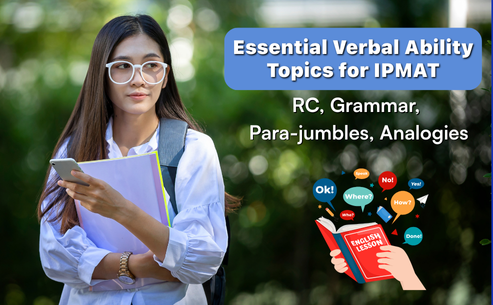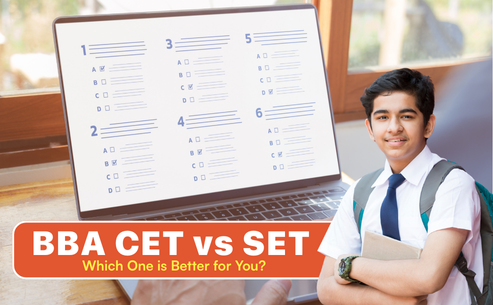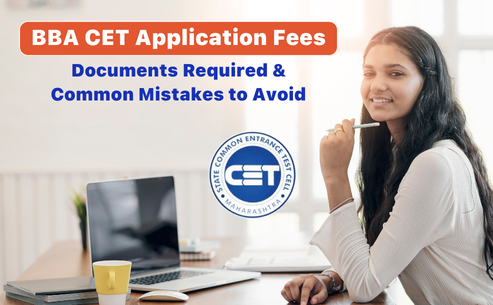The IPMAT (Integrated Program in Management Aptitude Test) is one of India’s most prestigious entrance exams for students aiming to join the 5-Year Integrated Program in Management at IIM Indore or IIM Rohtak. Of the three sections tested – Quantitative Aptitude, Logical Reasoning (for Rohtak only), and Verbal Ability—the Verbal Ability (VA) section holds special importance.
Why? It carries high weight and provides a strong scoring opportunity if prepared strategically. While many aspirants focus heavily on Quant, a well-prepared candidate knows that VA often becomes the differentiator between a good score and a top score.
The essential verbal ability topics for IPMAT—Reading Comprehension (RC), Grammar, Para-jumbles, and Analogies—form the backbone of this section. Mastering these ensures you can handle diverse question types confidently, from inference-based RCs to grammar error-spotting and analogy-based word relationships.
Here’s why the VA section is critical for IPMAT aspirants:
| Reason | Why It Matters in IPMAT |
| High Weightage | Largest section in Indore (45 Qs) and equally weighted in Rohtak (40 Qs). |
| Easier to Improve | Unlike Quant, VA scores improve quickly with daily practice of reading, grammar, and vocabulary. |
| Overlaps with Other Exams | Helps in NPAT, SET, CUET, and other BBA entrances where RC and grammar dominate. |
| Boosts Overall Score | Many toppers secure a big lead through strong VA performance. |
In this blog, we’ll dive deep into key verbal ability topics—RC, Grammar, Para-jumbles, and Analogies—along with their weightage, strategies, and common mistakes to avoid. You’ll have a clear roadmap to ace the VA section in IPMAT Indore and Rohtak by the end.
Structure of Verbal Ability in IPMAT (Indore & Rohtak)
Before discussing the essential verbal ability topics for IPMAT, it’s important to understand how the Verbal Ability (VA) section is structured in both the IIM Indore and IIM Rohtak exams.
While both assess your English language skills, they differ in question distribution, difficulty level, and emphasis on certain topics.
IPMAT Indore (2026 Pattern)
- 45 questions
- 40 minutes sectional time
- All MCQs with +4 for correct and -1 for incorrect answers
- Strong focus on Reading Comprehension, Grammar, and Vocabulary
- RCs are inference-heavy, not just factual
IPMAT Rohtak (2026 Pattern)
- 40 questions
- 40 minutes sectional time
- All MCQs with +4 for correct and -1 for incorrect answers
- Balanced mix of RC, Grammar, Vocabulary, and Para-based questions
- Includes poem-based and short RCs in addition to standard passages
Comparison: IPMAT Indore vs IPMAT Rohtak – Verbal Ability
| Feature | IPMAT Indore (2026) | IPMAT Rohtak (2026) |
| No. of Questions | 45 | 40 |
| Time Limit | 40 mins | 40 mins |
| Question Type | MCQs only | MCQs only |
| Negative Marking | –1 for wrong answers | –1 for wrong answers |
| RC Emphasis | 2–3 passages (8–10 Qs) | 4 RC sets (~10 Qs, incl. poem/short RCs) |
| Grammar Focus | High (Sentence Correction, Error Spotting) | High (Active/Passive, Conjunctions, S-V Agreement) |
| Vocabulary | Synonyms, Antonyms, Idioms, Word Usage | Synonyms, Antonyms, Spelling Errors, Idioms |
| Para-based Qs | Para-jumbles & Completion | Para-jumbles & Odd Sentence Out |
| Difficulty Level | Easy to Moderate | Easy to Moderate |
Takeaway for Aspirants:
- Indore VA is slightly more RC and Grammar-intensive.
- Rohtak VA balances RC, Grammar, Vocabulary, and Para-based Qs with unique variations like poem-based RCs.
- Preparing comprehensively for these four pillars—RC, Grammar, Para-jumbles, Analogies/Vocab—will cover 90%+ of the verbal syllabus for both exams.
Why Focus on Verbal Ability?
For many IPMAT aspirants, Quantitative Aptitude often takes the spotlight. However, seasoned mentors and toppers know that the Verbal Ability (VA) section is where students can gain a competitive edge. Here’s why:
1. High Weightage
- In IPMAT Indore, Verbal Ability is the most significant section with 45 questions (50% of the entire paper if we compare VA vs. one Quant part).
- IPMAT Rohtak is equally weighted with Quant and LR at 40 questions each.
- A strong VA score boosts your percentile significantly.
2. Scoring Advantage
Unlike Quant, which requires step-by-step problem solving, VA questions often test reading speed, grammar accuracy, and logical sequencing—skills that can be sharpened quickly with practice.
| Section | Nature of Questions | Improvement Speed |
| Quantitative Aptitude | Concept-heavy, time-consuming, requires Class 11–12 Math clarity | Slow (months of consistent practice) |
| Verbal Ability | RCs, Grammar, Vocab, Para-based questions | Faster (visible improvement in weeks with daily reading & grammar drills) |
3. Overlap with Other Exams
- Preparing for IPMAT VA will automatically help in NPAT, SET, CUET, Christ University ET, and even MBA entrance exams like CAT in the future.
- RC, Grammar, and Vocabulary are universal skill sets that stay relevant across exams.
4. Differentiator Between Good & Top Scores
Most aspirants prepare adequately for Quant but underestimate Verbal Ability.
- A candidate with average Quant but excellent VA can easily outperform peers.
- Many toppers report that Verbal was their score booster in IPMAT.
Bottom Line: Verbal Ability is not just an “English test”—it’s your opportunity to score high, save time, and strengthen your overall percentile.
Essential Verbal Topics for IPMAT
1. Reading Comprehension (RC)
Why RC is essential:
Reading Comprehension forms the core of the Verbal Ability section in both IPMAT Indore and Rohtak. It checks your reading speed and your ability to analyse, infer, and interpret information from diverse passages.
Types of Passages in IPMAT
- IPMAT Indore:
- 2–3 passages, medium length (300–450 words).
- Topics: business, abstract themes, fiction, and social issues.
- Questions: inference-based, main idea, tone, vocabulary in context.
- IPMAT Rohtak:
- 4 RC sets (~10 questions total).
- Includes poem-based RCs, short RCs, and full-length passages.
- A mix of factual, inference, and vocabulary questions.
Expected RC Weightage
| Exam | No. of Passages | Approx. Questions | Difficulty |
| IPMAT Indore | 2–3 | 8–10 | Easy to Moderate |
| IPMAT Rohtak | 4 (incl. poem/short RCs) | ~10 | Moderate |
Common RC Question Types
- Main idea or central theme of the passage.
- Tone/attitude of the author (analytical, critical, neutral, etc.).
- Inference-based Qs (reading between the lines).
- Vocabulary in context (meaning of a word/phrase).
- Fact-based Qs (directly from the passage).
Preparation Strategy for RC
- Daily Reading Practice:
- Read editorials from The Hindu, The Indian Express, and The Guardian.
- Alternate between fiction (novels/short stories) and non-fiction (essays, opinion columns).
- Note Vocabulary in Context: Build a word journal with meanings and example sentences.
- Timed Practice: Solve at least 2 RCs daily in exam conditions (strict time limit).
- Inference Training: Focus on questions that require “what can be concluded” rather than “what is stated.”
Common Mistakes to Avoid
- Skimming too fast: Leads to missing context and tone.
- Overthinking options: Stick to what is supported by the passage.
- Ignoring vocabulary-in-context Qs: These are scoring but often overlooked.
Key Tip: Treat RC like a habit, not just a practice set. Reading 30 minutes daily outside of prep material will naturally improve comprehension and speed over time.
2. Grammar & Sentence Correction
Why Grammar Matters:
In IPMAT, grammar-based questions are direct scoring opportunities. Unlike RCs, where interpretation varies, grammar follows fixed rules—making it possible to secure full marks with consistent practice.
IPMAT Indore and Rohtak test your grasp of grammar through Error Spotting, Sentence Correction, and Sentence Completion.
Expected Grammar Weightage
| Exam | Approx. No. of Questions | Types of Questions | Difficulty |
| IPMAT Indore | 8–10 | Sentence Correction, Error Spotting, Fill-in-the-Blanks | Easy to Moderate |
| IPMAT Rohtak | 8 | Active/Passive, Conjunctions, Subject-Verb Agreement, Prepositions | Easy to Moderate |
Key Grammar Areas to Master
- Subject-Verb Agreement – e.g., “The committee is meeting today” (not are).
- Tenses & Consistency – ensure proper verb forms across sentences.
- Pronoun Usage – avoid ambiguity (e.g., he/him, they/them).
- Modifiers & Parallelism – maintain sentence balance.
- Prepositions & Conjunctions – correct word usage for sentence linking.
- Error Spotting – identify incorrect grammar segments.
- Sentence Improvement – choose the best corrected version.
Preparation Strategy for Grammar
- Rulebook Approach: Revise basics using Wren & Martin or concise grammar guides.
- Daily Drills: Attempt 15–20 grammar-based MCQs every day.
- Error Log: Maintain a notebook of repeated grammar mistakes.
- Application Practice: Solve past year IPMAT papers for grammar-heavy sections.
Common Mistakes to Avoid
- Ignoring grammar for RC: Many aspirants assume VA = only RC. In reality, grammar covers 20–25% of marks.
- Over-relying on intuition: English “sounding right” isn’t enough—stick to rules.
- Skipping revisits: Grammar rules need weekly revision to stay sharp.
Key Tip: Grammar is the fastest area to improve in VA. Mastering 15–20 rules can give you a solid 8–10 marks boost in Indore and Rohtak.
3. Para-jumbles & Odd Sentence Out
Why it’s important:
These questions test your logical flow of ideas and ability to arrange jumbled sentences into a coherent passage. In IPMAT, para-jumbles and odd sentence outs are frequently included to check reading comprehension and logical reasoning in English.
Expected Weightage
| Exam | Question Types | Approx. Questions | Difficulty |
| IPMAT Indore | Para-jumbles, Para Completion | 4–5 | Moderate |
| IPMAT Rohtak | Para-jumbles, Odd Sentence Out | 4 | Moderate |
Types of Questions
- Standard Para-jumbles:
- 4–5 sentences given, arrange in correct order.
- Odd Sentence Out:
- One sentence doesn’t fit in the logical sequence—identify and eliminate.
- Para Completion (Indore):
- Choose the sentence that best completes the paragraph.
How to Approach Para-jumbles
- Look for Introductory Sentences: Usually contain broader ideas or definitions.
- Identify Pronouns & Connectors: Words like he, she, it, however, and therefore often link sentences.
- Chronology Clues: Time references (first, later, finally).
- Cause & Effect: Logical flow (problem → reason → solution).
Preparation Strategy
- Solve 5 para-jumble sets daily (start untimed, then move to timed).
- Practice from past IPMAT papers & sectional mocks.
- Read short opinion pieces to observe idea sequencing.
- Write your own 4–5 sentence paragraphs and shuffle them as exercises.
Common Mistakes to Avoid
- Guessing blindly: Don’t treat para-jumbles like puzzles; use logical connectors.
- Overlooking odd sentences out: Many aspirants skip these as “confusing,” but they’re often scoring.
- Not practising enough: Para-jumbles require daily exposure, not just “theory reading.”
Key Tip: Treat para-jumbles as logical puzzles within English. Consistent exposure improves accuracy and speed, two critical aspects of IPMAT’s 40-minute VA section.
4. Analogies & Vocabulary-Based Questions
Why it’s important:
Analogies and vocabulary-based questions test your word knowledge, contextual understanding, and logical connections between words. They often appear as short, quick-to-solve questions, making them highly scoring if you prepare systematically.
Expected Weightage
| Exam | Types of Questions | Approx. Questions | Difficulty |
| IPMAT Indore | Synonyms, Antonyms, Idioms, Analogies, One-word substitutions | 8–10 | Easy to Moderate |
| IPMAT Rohtak | Synonyms, Antonyms, Spelling Errors, Idioms, Analogies, Fillers | 8–10 | Easy to Moderate |
Types of Vocabulary & Analogy Questions
- Analogies
- Relationship-based pairs (e.g., Doctor : Hospital :: Teacher : School).
- Can test function, classification, synonyms/antonyms, or degree.
- Synonyms & Antonyms
- Identify the word closest/opposite in meaning.
- Idioms & Phrases
- Example: “Beat around the bush” → Avoid the main topic.
- One-word Substitutions
- Example: “A person who speaks many languages” → Polyglot.
- Word Usage / Confusing Words
- Example: Affect vs. Effect, Principle vs. Principal.
- Fillers (Contextual Vocabulary)
- Choose the word that fits the sentence meaningfully.
- Spelling Errors (Rohtak focus)
- Spot the incorrectly spelt word.
Preparation Strategy
- Book-Based Learning: Use Word Power Made Easy (Norman Lewis) for systematic vocabulary building.
- Daily Word Journal: Learn 5–10 new words daily with meanings, synonyms, antonyms, and usage.
- Idioms in Context: Practice idioms through newspaper editorials instead of rote memorisation.
- Analogy Practice: Solve analogy sets to recognise patterns quickly.
- Mock Test Exposure: Attempt vocab-based timed quizzes to replicate exam pressure.
Common Mistakes to Avoid
- Rote learning without context: Memorising words without usage reduces retention.
- Ignoring idioms: Many students skip them but carry 2–3 easy marks.
- Overconfidence in spelling: Simple errors in Rohtak spelling Qs can cost marks.
Key Tip: Treat vocabulary like a long-term skill, not a last-minute cram. Consistent reading + contextual practice ensures steady improvement and makes vocab-based questions a scoring asset.
Additional Verbal Ability Topics to Prepare
While RC, Grammar, Para-jumbles, and Analogies/Vocabulary make up the core of IPMAT’s Verbal Ability section, the exam often includes additional question types that shouldn’t be ignored. These questions may seem small in number, but they can provide quick scoring opportunities.
1. Cloze Test
- A passage with multiple blanks where you select the most appropriate words.
- Tests grammar + vocabulary, + contextual sense together.
- Strategy: Read the entire passage once, understand the theme, and then fill in the blanks logically.
2. Sentence Completion / Fill-in-the-Blanks
- Usually single-sentence with one or two blanks.
- Requires contextual vocabulary and knowledge of connectors.
- Example: He was _______ to see his old friend after many years. (delighted/shocked depending on tone).
3. Word Usage & Confusing Words
- Questions that test your ability to pick the correct usage of similar words.
- Example: Affect vs Effect, Principle vs Principal, Compliment vs Complement.
- Strategy: Maintain a list of confusing pairs and practice with examples.
4. Odd Sentence Out (Rohtak focus)
- A variant of para-jumbles where one sentence doesn’t fit in the sequence.
- Strategy: Identify the central theme of the passage; eliminate the out-of-context sentence.
Approximate Distribution of “Additional” VA Topics
| Topic | IPMAT Indore (2026) | IPMAT Rohtak (2026) |
| Cloze Test | 1–2 Qs (occasional) | 2 Qs (common) |
| Sentence Completion | 3–4 Qs | 2 Qs |
| Word Usage | 1–2 Qs | 2 Qs |
| Odd Sentence Out | 1 Q | 2 Qs |
Key Tip: Even if these topics form a small portion (5–7 marks), they are often low-effort, high-reward areas. Don’t neglect them while preparing for the bigger topics.
Snapshot: Topic-Wise Weightage in IPMAT Verbal Ability
Based on past trends from IPMAT Indore and IPMAT Rohtak, here’s how the Verbal Ability (VA) section is usually distributed across different topics.
Topic-Wise Weightage Table
| Topic | IPMAT Indore (Approx.) | IPMAT Rohtak (Approx.) |
| Reading Comprehension (RC) | 8–10 Qs (2–3 passages, inference-heavy) | ~10 Qs (4 sets incl. short & poem-based) |
| Grammar + Sentence Correction | 10 Qs (Error spotting, correction, fill-in-the-blanks) | 8 Qs (S-V agreement, active/passive, conjunctions) |
| Vocabulary (Synonyms, Antonyms, Idioms, One-word, Word Usage) | 8–10 Qs | 8–10 Qs (incl. spelling errors & fillers) |
| Para-jumbles / Para Completion / Odd Sentence Out | 4–5 Qs (para-jumbles + completion) | 4 Qs (para-jumbles + odd sentence out) |
| Analogies | 2–3 Qs | 2–3 Qs |
| Cloze Test / Sentence Completion | 2–3 Qs | 2–3 Qs |
Key Takeaways from the Distribution
- Indore VA is slightly RC + Grammar intensive.
- Rohtak VA has a balanced mix, but with unique inclusions like poem-based RCs and spelling errors.
- Vocabulary + Grammar together form nearly 40–45% of VA questions in both exams.
- RC remains the backbone—consistent reading practice is non-negotiable.
Quick Tip for Aspirants:
If you’re short on prep time, prioritise RC + Grammar + Vocabulary first, as they cover 70%+ of the Verbal section. Para-jumbles and analogies can be practised alongside as boosters.
How to Prepare for IPMAT Verbal Ability?
Cracking the Verbal Ability (VA) section of IPMAT requires a blend of daily habits, conceptual clarity, and exam-oriented practice. Unlike Quant, where progress is gradual, verbal skills can improve significantly within weeks if you follow a structured approach.
1. Daily Reading Habit
- Read editorials from The Hindu, The Indian Express, and The Guardian.
- Alternate between fiction (novels, short stories) and non-fiction (essays, opinion columns).
- Target: 30–40 minutes daily to improve speed, comprehension, and vocabulary in context.
2. Vocabulary Building
- Learn 5–10 new words daily with meanings, synonyms, antonyms, and example sentences.
- Use apps like Quizlet or flashcards for revision.
- Book recommendation: Word Power Made Easy by Norman Lewis.
- Pro tip: Focus on word usage in context, not rote memorisation.
3. Grammar Drills
- Revise basic grammar rules weekly (subject-verb agreement, tenses, modifiers, prepositions).
- Practice 15–20 error-spotting/sentence correction questions daily.
- Maintain an error log notebook to track and correct repeating mistakes.
4. RC Practice with Timer
- Solve 2 RC sets daily under strict time limits.
- Practice inference-based questions more, since they dominate IPMAT RCs.
- After solving the problem, spend equal time analysing mistakes—understand why the wrong option was wrong.
5. Para-jumbles & Analogies
- Practice 3–4 para-jumble sets every day.
- Solve analogy/vocab quizzes regularly to identify word relationships quickly.
- Look for connectors, pronouns, and chronology clues while solving para-based questions.
6. Mock Tests & Sectionals
- Attempt 1 sectional test weekly in the early stages.
- Gradually shift to 2–3 full-length mocks per week closer to the exam.
- Always analyse mock attempts—track accuracy, time spent per question, and recurring errors.
Suggested Weekly Plan (for 3–4 months prep)
| Day/Task | Focus Area | Practice Target |
| Daily | Reading (editorials/novels) | 30–40 mins |
| Daily | Vocabulary | 5–10 words + revision |
| Daily | Grammar | 15–20 MCQs |
| Daily | RC Practice | 2 sets under timer |
| 3 Days/Week | Para-jumbles + Odd Sentence | 3–4 sets |
| 2 Days/Week | Analogies + Word Usage | 20–25 Qs |
| Weekly | Sectional Mock (VA only) | 1 test + analysis |
| Final 6 Weeks | Full-Length Mocks | 2–3 per week |
Key Tip: Verbal Ability preparation is about consistency, not cramming. Even 1 hour of structured daily practice can make you exam-ready in a few months.
Common Mistakes to Avoid in Verbal Ability
Many aspirants underestimate the Verbal Ability (VA) section, thinking it’s “just English.” However, this leads to avoidable errors that cost crucial marks. Here are the most common pitfalls in IPMAT VA prep and how to avoid them:
1. Over-relying on Guesswork in RC
- Problem: Students skim passages and guess answers without evidence.
- Impact: RC questions are inference-heavy, so guesswork reduces accuracy.
- Fix: Read carefully, underline keywords, and eliminate extreme/unrelated options.
2. Ignoring Grammar Rules
- Problem: Many aspirants assume grammar is easy and skip it.
- Impact: Grammar + sentence correction = 20–25% of VA marks.
- Fix: Revise 10–15 key rules (S-V agreement, tenses, modifiers, prepositions) weekly.
3. Memorising Vocabulary Without Context
- Problem: Students cram word lists but forget them in the exam.
- Impact: Low retention, poor application in analogies/fillers.
- Fix: Learn new words in sentences. Example: “Her magnanimous gesture won hearts.”
4. Neglecting Para-jumbles
- Problem: Treated as “too subjective,” leading to avoidance.
- Impact: Misses out on 4–5 easy marks.
- Fix: Practice daily using connectors, pronouns, and chronology clues.
5. Not Practising Under Timed Conditions
- Problem: Practising VA questions without time limits.
- Impact: Slow reading speed → inability to attempt all 40–45 questions in 40 mins.
- Fix: Solve RCs and VA mocks with a stopwatch. Aim for 45 Qs in 40 mins.
6. Skipping Mock Analysis
- Problem: Taking mocks but not analysing mistakes.
- Impact: The same errors are repeated in the actual exam.
- Fix: Spend 1.5x test duration reviewing errors and noting patterns.
7. Overlooking Small Topics (Idioms, Fillers, Word Usage)
- Problem: Students only focus on RC and Grammar.
- Impact: Missed easy 5–7 marks from minor topics.
- Fix: Cover small but scoring topics like idioms, spelling errors, and cloze tests.
Key Tip: The VA section rewards consistency. Avoid shortcuts, and balance RC, Grammar, Vocabulary, and Para-based questions with equal attention.
Best Books & Resources for IPMAT Verbal Ability
The right study material can make your IPMAT Verbal Ability prep structured and efficient. Here’s a curated list of books, online platforms, and practice resources that cover Reading Comprehension, Grammar, Para-jumbles, and Vocabulary/Analogies.
Books for Core Topics
| Topic | Recommended Resources | Why Useful |
| Reading Comprehension (RC) | – Editorials (The Hindu, Indian Express) – Practice RC Passages from coaching portals | Builds inference & speed; simulates exam-level RCs |
| Grammar & Sentence Correction | – Wren & Martin: High School Grammar – English Grammar & Composition – S.C. Gupta | Covers rules + MCQs for practice |
| Vocabulary (Synonyms, Antonyms, Idioms, Analogies) | – Word Power Made Easy – Norman Lewis – 30 Days to a More Powerful Vocabulary – Wilfred Funk | Builds contextual vocab + analogy practice |
| Para-jumbles & Odd Sentence Out | – Verbal Ability & Reading Comprehension – Arun Sharma | Targeted practice sets with detailed explanations |
Online Practice Platforms
- Tarkashastra Mock Tests & Sectionals – Closely designed as per the IPMAT pattern.
Daily Reading Sources
- Newspapers: The Hindu, Indian Express, The Guardian.
- Magazines: The Economist, TIME.
- Books: Fiction (for flow) & Non-fiction (for abstract/analytical RC prep).
Quick Resource-to-Topic Map
| Topic | Go-To Resource |
| RC | Editorials + sectional mocks |
| Grammar | Wren & Martin, Error Spotting practice sets |
| Vocabulary | Word Power Made Easy, flashcards |
| Para-jumbles | Arun Sharma (VARC), past papers |
| Analogies | Norman Lewis vocab + analogy sets |
Pro Tip: Don’t overload on multiple books. Stick to 1 book + 1 practice source per topic, and supplement with daily mocks for exam-like practice.
Conclusion
The Verbal Ability section in IPMAT isn’t just about testing your English—it’s about evaluating how well you can read, understand, and logically apply language under time pressure. Among all the question types, the four pillars—Reading Comprehension, Grammar, Para-jumbles, and Analogies/Vocabulary—form the backbone of preparation.
Here’s what we’ve learned:
- RC is the heaviest and most critical component—daily reading is non-negotiable.
- Grammar offers direct scoring opportunities if you master the key rules.
- Para-jumbles & Odd Sentence Out: sharpen your logical sequencing skills.
- Analogies & Vocabulary ensure that you handle quick, high-scoring questions confidently.
- Smaller topics like Cloze Tests, Fillers, and Word Usage should not be ignored, as they can fetch easy marks.
Ultimately, VA is often the game-changer in IPMAT. Candidates who balance Quant with a strong VA performance usually rank in the top percentile.
At Tarkashastra, we help aspirants go beyond just books—we focus on structured preparation, daily practice, mock analysis, and mentor-driven guidance. The Verbal Ability section can become your biggest score booster with the right approach.
Final Tip: Treat VA not as a subject to cram, but as a skill to build daily. Every editorial you read, every grammar error you fix, every new word you learn—brings you closer to acing IPMAT.
FAQs – Essential Verbal Ability Topics for IPMAT
1. How many questions are asked in the IPMAT Indore and Rohtak Verbal Ability section?
In IPMAT Indore, the VA section has 45 MCQs in 40 minutes, while in IPMAT Rohtak, it has 40 MCQs in 40 minutes. Both carry a negative marking of -1 for incorrect answers.
2. Which is the most crucial topic in IPMAT Verbal Ability?
Reading Comprehension (RC) is the most important since it accounts for nearly 20–25% of the section. A mix of inference, tone, and vocabulary-based questions makes RC the backbone of preparation.
3. Are grammar questions asked in both Indore and Rohtak?
Yes, grammar-based questions such as error spotting, sentence correction, and subject-verb agreement are common in both exams. Indore focuses slightly more on correction-based MCQs, while Rohtak adds voice and conjunction questions.
4. How many RC passages usually appear in IPMAT exams?
Indore typically features 2–3 medium-length RCs with 8–10 questions. At the same time, Rohtak includes 4 RC sets, sometimes with short or poem-based passages, totalling around 10 questions.
5. What type of questions are asked in Para-jumbles?
Students are asked to arrange jumbled sentences into a logical order. Para Completion may also appear in Indore, while in Rohtak, Odd Sentence Out is included alongside para-jumbles.
6. Are vocabulary-based questions frequent in IPMAT?
Both exams have 8–10 vocabulary questions covering synonyms, antonyms, idioms, analogies, and one-word substitutions. Rohtak also includes spelling errors and fillers.
7. Are analogies a scoring topic in IPMAT?
Yes, analogies are highly scoring since they are short and direct. They test word relationships such as synonym-antonym, function, or classification, and usually cover 2–3 questions.
8. Does IPMAT Rohtak include poem-based RCs?
Yes, unlike Indore, Rohtak sometimes includes poem-based or very short RC passages, which test tone, theme, and vocabulary in context.
9. How difficult is the Verbal Ability section compared to Quant?
VA is generally easier and has more scoring than Quant. While Quant requires Class 11–12 level math, VA relies on reading speed, grammar rules, and vocabulary, which can improve quickly.
10. Which books are best for IPMAT vocabulary?
Word Power Made Easy by Norman Lewis and 30 Days to a More Powerful Vocabulary by Wilfred Funk are the most recommended books. They focus on contextual learning instead of rote memorisation.
11. What grammar rules should I prioritise for IPMAT?
Focus on subject-verb agreement, tense consistency, pronouns, modifiers, prepositions, and parallelism. These rules frequently appear in sentence correction and error spotting questions.
12. How should I prepare for RC passages effectively?
Read editorials daily, practice at least 2 RC sets under timed conditions, and focus on inference and tone-based questions. Maintain a vocabulary journal for unfamiliar words encountered during reading.
13. Do Cloze Tests appear in IPMAT?
Yes, Cloze Tests occasionally appear, more commonly in Rohtak. They test your grammar, vocabulary, and context skills together, usually 1–2 questions in Indore and 2 in Rohtak.
14. Is the VA section time-consuming?
Compared to Quant, VA is faster since most questions are short. However, RCs can be time-consuming, so practising speed reading and timed mocks is essential to attempt all 40–45 questions.
15. How can I improve accuracy in Para-jumbles?
Look for connectors, pronouns, chronology words, and cause-and-effect links. Practising 3–4 sets daily builds familiarity with sentence flow and improves accuracy under time pressure.
16. Are idioms and phrases essential for IPMAT?
Yes, idioms and phrases frequently appear in 2–3 questions. They test contextual understanding of expressions, making them a quick scoring area if practised well.
17. Does IPMAT have negative marking in VA?
Indore and Rohtak apply –1 for every wrong answer in VA. Hence, random guessing is risky unless you eliminate at least two bad options.
18. Should I prepare spelling-based questions for Rohtak?
Yes, Rohtak includes spelling error questions in its vocabulary section. Regular revision of commonly confused spellings can help secure these easy marks.
19. How vital is vocabulary-in-context for RC?
Very important—RC passages often ask the meaning of words in context. It’s not just about knowing the definition but understanding how the word fits the passage.
20. Are one-word substitution questions asked?
Indore and Rohtak include 1–2 questions on one-word substitutions. These tests vocabulary depth and are usually straightforward if prepared from word lists.
21. How many marks can VA contribute to my overall IPMAT score?
Indore, VA contributes 180 marks out of 360 (50%). In Rohtak, it contributes 160 marks out of 480 (equal to Quant & LR). This makes it a crucial score booster.
22. Is reading novels useful for VA prep?
Yes, novels—especially nonfiction or classic fiction—help improve reading speed, comprehension, and exposure to diverse writing styles. They complement RC preparation.
23. Should I practice odd sentence out questions?
Yes, especially for Rohtak, where 2 such questions are common. Identifying the out-of-context sentence improves logical reading and sequencing skills.
24. Are IPMAT VA questions similar to CAT VA/RC?
Yes, the structure is similar, but IPMAT is slightly easier. IPMAT focuses more on RCs, grammar, and vocabulary, while CAT heavily emphasises RC and critical reasoning.
25. How much time should I dedicate daily to VA preparation?
It is recommended that you spend at least 1 – 1.5 hours daily on reading (30 mins), grammar/vocab drills (20 mins), RC practice (30 mins), and para-based/vocab exercises (10–15 mins).







